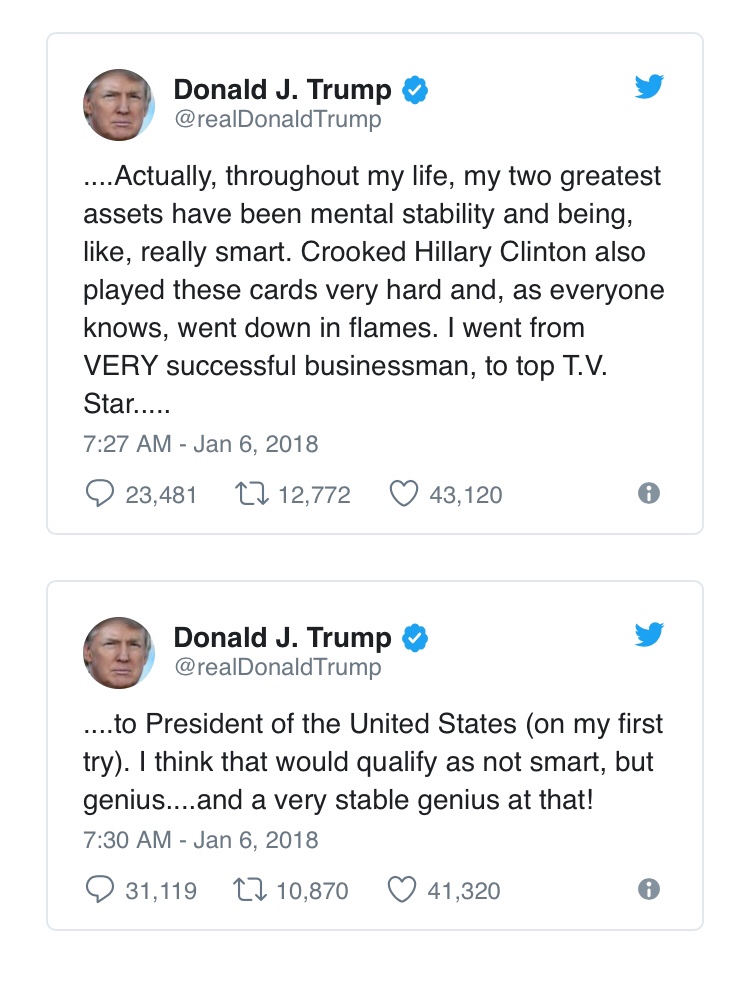Oh, that way madness lies; let me shun that.
Donald Trump’s latest tweets – about how he isn’t insane – indisputably make the case that he is. There can’t be much doubt, now.
What now? What do we do? What should be our method, in the face of such madness?
I wrote about his madness months ago, while in Boston. The problem I wrote about them remains the problem now.

BOSTON – Is being batshit crazy an impediment to high public office?
It is a question being much-debated, these days, down here in the Disunited States. As the Unpresident continues his ever-downward descent into the darkest, dankest depths – praising neo-Nazis and white supremacists, threatening to shut down the U.S. Government if Congress doesn’t give him his wall to keep out Mexicans – many serious people are asking a serious question: is Donald Trump insane? Is he nuts? Is he now, at long last, fit to be declared unfit?
Trump represents uncharted territory for the world. But the dilemma of what to do when a politician loses his or her marbles – not so much. It’s happened before, and not just down here in the United States, the nation now fully at war with itself.
It happens all the time, all over. What isn’t so ubiquitous is how nations deal with the madmen at the top.
In Canada, we’ve had a leader who communed with his dead mother, and regularly talked to his dog. He thought Hitler was a saint. But that man – Mackenzie King – was Prime Minister, and our longest-serving Prime Minister, no less. Many knew he was certifiable, but history does not record any successful attempts to separate him from his office.
The 25th Amendment to the U.S. Constitution anticipated the madman named Trump. America’s constitutional forefathers were not so wise about everything – their idiotic Second Amendment pledge to permit citizens to maintain “militias” carrying around assault rifles, for instance, has rendered U.S. schools and work places veritable shooting galleries.
That amendment was what allowed everything from Sandy Hook to the assassinations of Dr. King and the Kennedy brothers to happen. It made this country the preferred jurisdiction of every modern mass-murderer.
But the 25th Amendment, in contrast, was smart. It was prescient. It reads:
“Whenever the President transmits to the President pro tempore of the Senate and the Speaker of the House of Representatives his written declaration that he is unable to discharge the powers and duties of his office, and until he transmits to them a written declaration to the contrary, such powers and duties shall be discharged by the Vice President as Acting President.”
The 25th amendment is mainly preoccupied with process. As with lawyers, as with founding forefathers: the solution to process is more process. And the 25th is certainly mostly about process.
But it is those ten slender words – “unable to discharge the powers and duties of his office” – that bedevil many Americans, in these dark days. What does that mean, to be “unable” to be President of the United States? What is the standard? What is the threshhold?
When a president brags about sexually assaulting women? When he calls other nations, allies, rapists and murderers? When he mocks the disabled? When he breaks laws, over and over? When he discriminates? When he aligns himself with the Ku Klux Klan, and – on Twitter – threatens a nuclear war that will claim the lives of millions? Then?
The 25th Amendment has been used before, in real life and on TV. On the TV series ‘Designated Survivor,’ starring Canadian Kiefer Sutherland as president, the 25th Amendment is invoked when Sutherland’s character must go under a surgeon’s scalpel after an assassination attempt. It’s a big deal, taking up a couple episodes of the show.
And in the real world – which frankly seems far less real, since Agent Orange was sworn in as America’s 45th president – the Amendment has been applied only a half-dozen times since it’s adoption. When Gerald Ford succeeded Richard Nixon as president; when Ronald Reagan needed a colonoscopy, or when George W. Bush needed one, too; and so on. Resignations and colonoscopies: that has been the history of the 25th amendment, until now.
So, how does one go about determining that Donald Trump is unstable and therefore unable? Who determines that, and how? It is no simple thing.
Trump is not the first lunatic to lead the Republican Party. In 1964, the GOP’s leader was Arizona’s Barry Goldwater, a far-Right autocrat who called extremism a virtue, and who wanted to use nuclear weapons against anyone who disagreed with him. Goldwater was not dispatched by a constitutional amendment – he was destroyed in the presidential election by a Democratic Party ad caled Daisy (and after which I named my own firm, full disclosure). Daisy worked because it called Goldwater’s sanity into question.
But, in the days leading up to the November 1964 vote, a few psychiatrists also decided to opine on Goldwater’s mental stability from afar. Without having examined him up-close, the psychiatrists declared Goldwater mentally ill, and therefore unable to discharge presidential duties.
That set off a huge controversy in the American psychiatric community. And it led to the creation of what is called, down here, the “Goldwater Rule” – that is, a psychiatrist cannot now diagnose a person without them having first been a patient. In fairness, it is probably a good rule: if unpopular politicians could be removed from office by a stranger’s psychiatric speculation, then there will not be many politicians left in office, will there?
For the 75 per cent of Americans who want Trump gone, the Goldwater Rule is a dilemma. Donald Trump’s regime, enveloped in crisis and scandal as it is, is unlikely to offer up their “president” for examination by anyone’s head shrinks, anytime soon. If he is to be removed, the 25th Amendment to the Constitution won’t be the methodology.
Besides, it is not enough to call Donald Trump crazy. He is far worse than that. He is a serial liar and a cheat, a swindler and a con man. And, by his own admission, he is a “man” who sexually assaults women.
My favourite poet is Theodore Roethke. In one of his masterworks, In A Dark Time, Roethke writes:
“What’s madness but nobility of soul
At odds with circumstance?”
There is nothing noble about Donald Trump’s soul. He may be a madman, but he does not belong in an asylum. He belongs somewhere else.
Jail.





